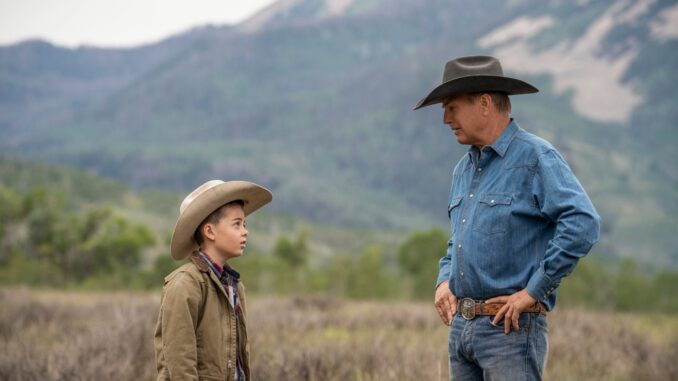
The Dust Settles, The Screen Flickers: Yellowstone's Final Teaser and the Roar of the Fans
In the sprawling, untamed heart of the American West, where golden hour light spills across endless plains and the whisper of ancient winds carries tales of struggle and survival, Yellowstone found its soul. More than just a television show, Taylor Sheridan's epic saga of the Dutton family and their embattled ranch became a cultural phenomenon, a modern western steeped in themes of legacy, power, and the unyielding grip of the land. Now, as the sun begins its final descent on the series, the recent drop of a new teaser for Yellowstone's concluding episodes was not merely a marketing beat; it was a seismic event, sending tremors of anticipation, anxiety, and fervent speculation through a deeply invested fanbase.
The announcement of Yellowstone's end, following Kevin Costner's departure, landed like a thunderclap across the vast digital frontier. For years, viewers had been anchored to the Duttons' struggles, their triumphs, and their often-brutal choices, feeling the dust on their boots and the weight of their impossible burdens. The ranch, a character in itself, embodied a quintessentially American dream – and nightmare – of ownership and defense. The impending finale thus carries the heavy mantle of expectation. How will the battles conclude? Will justice, or merely survival, prevail? What will become of Beth’s fiery vengeance, Jamie’s tormented ambition, and the very soul of the ranch John Dutton fought so fiercely to protect? These questions have brewed in the collective consciousness of fans, simmering like a distant prairie fire, waiting for the wind to pick up.
Then came the teaser. In the digital age, a teaser is a breadcrumb trail, a tantalizing whisper in the dark, designed to ignite speculation without revealing too much. This latest Yellowstone offering was precisely that: a rapid-fire montage of fleeting glances, of familiar faces etched with new resolve or despair, of thunderous hooves on open range, and the glint of steel. There was no dialogue, only an ominous score that built to a crescendo, suggesting not a resolution, but an impending collision. It was a promise of high stakes, of final confrontations, and an unspoken question hanging in the air: Who will ride off into the sunset, and who will be left in the dust? For fans, it was like a match striking in a darkened room, illuminating just enough to send their imaginations reeling.
The immediate reaction was a digital wildfire. Across social media platforms, dedicated forums, and comment sections, the internet erupted in a cacophony of clicks, keyboards, and collective gasps. The fan base, a diverse tapestry woven from urban cowboys, rural ranchers, and armchair strategists, converged into a single, roaring current.
There was, first and foremost, the unbridled excitement. "Finally!" was a common refrain, punctuated by a deluge of exclamation points and fire emojis. The long wait for resolution had tested patience, and this teaser was the first clear sign that the end was truly in sight. GIFs of Rip Wheeler’s stoic gaze or Beth Dutton’s defiant smirk flooded timelines, each one a shorthand for the palpable hype.
Alongside the excitement came the inevitable tsunami of speculation. Every fleeting shot was dissected with the precision of a seasoned detective. Was that a look of betrayal on Jamie’s face? Did the brief glimpse of Beth hint at a final, destructive act of vengeance? Theories about alliances, betrayals, and the ultimate fate of the ranch proliferated like tumbleweeds in a strong wind. Some theorized about potential deaths, others about surprising redemptions, and many debated the subtle cues about the rumored spin-off, hoping for hints about which characters might carry the torch forward. The comment sections became digital battlegrounds of foresight, each fan passionately defending their premonitions.
But beneath the surface of hype and theory, there was also a palpable undercurrent of anxiety and melancholy. For many, Yellowstone wasn't just entertainment; it was a weekly ritual, a connection to a rugged ideal, a saga they had deeply invested in. The "final episodes" meant the end of an era. "I don't want it to end!" was a lament frequently voiced, often paired with a sad face emoji. There was a dread that the ending might not live up to the epic scope of the series, or worse, that beloved characters might meet tragic fates. This wasn't just about plot points; it was about the impending farewell to a world and a family that had become, for a time, a significant part of their own lives.
The Yellowstone final episodes teaser, then, was far more than a clip; it was a cultural touchstone, a moment where a vast, disparate audience collectively held its breath, exhaled in a shared gasp, and then exploded into a chorus of anticipation and trepidation. It exemplified the unique power of modern television to forge communities, to elicit profound emotional investment, and to turn a mere preview into a communal ritual of farewell and fervent hope. As the dust begins to settle on the Duttons' saga, one thing is clear: the ending of Yellowstone will not just be watched; it will be experienced, debated, and mourned, a testament to its enduring legacy on the American landscape, both real and imagined.
